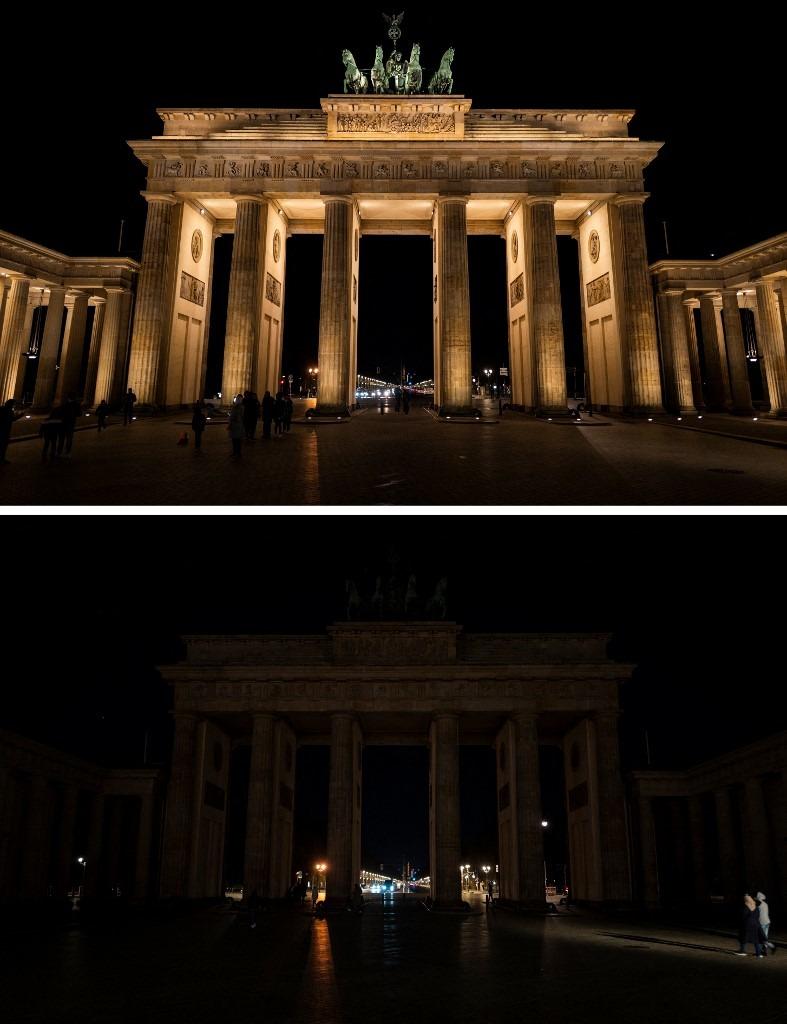 This combination of pictures created on March 27, 2021 shows Berlin's Brandenburg Gate illuminated minutes before the lights go out (top) and standing in the dark after its illumination was turned off on the occasion of Earth Hour, on March 27, 2021. (JOHN MACDOUGALL / AFP)
This combination of pictures created on March 27, 2021 shows Berlin's Brandenburg Gate illuminated minutes before the lights go out (top) and standing in the dark after its illumination was turned off on the occasion of Earth Hour, on March 27, 2021. (JOHN MACDOUGALL / AFP)
PARIS-Cities around the world turned off their lights on Saturday for Earth Hour, with this year's event highlighting the link between the destruction of nature and increasing outbreaks of diseases such as COVID-19.
In London, the Houses of Parliament, London Eye Ferris wheel, Shard skyscraper and neon signs of Piccadilly Circus were among the landmarks that flicked off the switches.
The three levels of the Eiffel Tour in Paris progressively went dark but there were few people to watch with the whole country under a 7 pm COVID-19 curfew.
The giant metal tower has been shut to the public since Oct 30 due to the pandemic.
Experts believe human activity such as widespread deforestation, destruction of animal habitats and climate change are spurring this increase. They warn more pandemics could occur if nothing is done
The lights went out at Rome's 2,000-year-old Colosseum, while police enforcing Italy's coronavirus movement restrictions checked the papers of a small crowd of onlookers.
Harmful human activity
Asia began the event after night fell with the skylines of metropolises from Singapore to Hong Kong going dark, as did landmarks including the Sydney Opera House.
ALSO READ: WWF: Earth Hour 2021 a critical moment to reverse nature loss
The Brandenburg Gate in Berlin and the Kremlin on Red Square in Moscow also joined the annual initiative that calls for action on climate change and the environment.
After Europe, Earth Hour moves west to the Americas with the Empire State Building in New York, the Obelisk of Buenos Aires and the Museum of Tomorrow in Rio de Janeiro among venues dimming the lights.
For this year, organizers said they want to highlight the link between the destruction of the natural world and the increasing incidence of diseases such as COVID-19 making the leap from animals to humans.
Experts believe human activity such as widespread deforestation, destruction of animal habitats and climate change are spurring this increase. They warn more pandemics could occur if nothing is done.
"Whether it is a decline in pollinators, fewer fish in the ocean and rivers, disappearing forests or the wider loss of biodiversity, the evidence is mounting that nature is in free fall," said Marco Lambertini, director-general of the World Wide Fund for Nature, which organizes Earth Hour.
READ MORE: Cities around the world turn off lights to mark Earth Hour
"And this is because of the way we live our lives and run our economies. Protecting nature is our moral responsibility but losing it also increases our vulnerability to pandemics, accelerates climate change, and threatens our food security."
Agencies via Xinhua contributed to this story.


